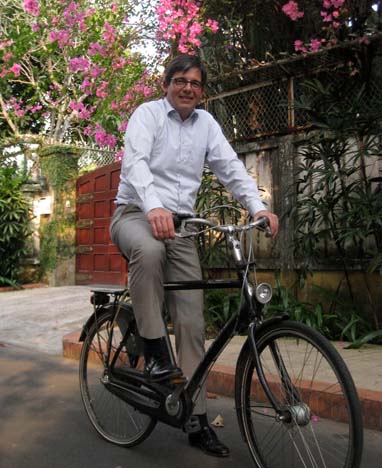Dutch man Simon van der Burg, who has lived in Vietnam for almost two years, shared the cycling experience from his country.
The Vietnamese Prime Minister recently allowed five major cities, Hanoi, Ho Chi Minh City, Hai Phong, Da Nang and Can Tho to coordinate with the Ministry of Transport in working out plans to improve public transport, control personal transport means, as well as launch public transport bicycle provision services on a piloting basis in downtown areas.
Burg said that in Vietnam, apart from going to work, he regularly rides his bicycle within district 2, where he and his family are living, for shopping and relaxation purposes. His kids also usually pedal to school.
During his two-year stay in Vietnam, he noticed that more locals, mostly youths and even the elderly, are cycling for sightseeing and exercise, which is a good sign.
“To enable people to ride a bike in the major Vietnamese cities, there should be a more bike-friendly infrastructure. It all starts with urban planning and priorities, whether we talk about pedestrian zones, metro systems or bicycle lanes. It can be done and it makes sense to take it into account in future planning. Cycling contributes significantly to urban mobility, road safety, traffic flow, the economy, social development, health and emission reduction,” Burg noted.
The Dutch has considerable experience with cycling and urban planning, road design, bike-parking, traffic policy or bicycle design and materials and is willing to share it.
“In order to get more people biking, there needs to be a bike-friendly infrastructure, inside and outside the major cities, which urban planners need to take into account. In addition to cycling paths, separate traffic lights for cyclists, special signs to regulate cycling traffic and places where cyclists park their bikes also need serious consideration,” he pointed out.
According to Burg, in the Netherlands, the world's number one cycling country, cycling is locals’ major means of transportation and most people ride the bike to school or work. In cities like Amsterdam and The Hague, up to 70% of all journeys are made by bike, either rain or shine.
However, they have to deal with gusts or rain, while Vietnamese bikers would have to face the heat and the rain.
“Vietnamese people are very creative and they did bike a lot in the past. With this experience I believe they will find solutions to cope with all the problems,” Burg added.





















































